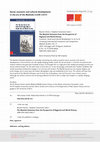Learning and Teaching by Fiona Handley

This paper considers how the pedagogy of archaeological teaching in higher education should respo... more This paper considers how the pedagogy of archaeological teaching in higher education should respond to the changing employment profile of archaeology and the heritage sector. It uses Wenger's model of Communities of Practice (CoP) to explore changes in the archaeological CoP and to generate ideas about new archaeological pedagogies. CoP is a model of learning that is particularly useful for vocational subjects where learning focuses on creating new members through legitimizing peripheral participation. This model is based on social learning and the transformation of identity, and is especially relevant to understanding archaeological teaching with its distinctive pedagogic activities such as fieldwork that bridge the professional/novice divide. This paper proposes that archaeology teaching prepares students for a variety of different and dynamic engagements within and outside the CoP in response to fewer full--time permanent career opportunities, for example temporary employment, re--training, and campaigning, with the aim of ensuring the CoP's sustainability. This involves developing a range of sophisticated pedagogic solutions that move beyond transferable skills, which develop the strengths of current archaeological pedagogy.
Archaeology and history of slavery by Fiona Handley
Assessment and feedback by Fiona Handley
In 2011 Southampton Solent University, a post-1992 university in southern England, introduced a n... more In 2011 Southampton Solent University, a post-1992 university in southern England, introduced a new marking scheme with the aims of changing marking practice to achieve greater transparency and consistency in marking, and to ensure that the full range of marks was being awarded to students. This paper discusses the strategic background to the scheme's development, analyses the role of the working group and stakeholder involvement in developing the initiative, and presents a critical commentary on its success within the frame of the university as a "learning organization" .
Articles by Fiona Handley

The Mamluk Sultanate represents an extremely interesting case study to examine social, economic a... more The Mamluk Sultanate represents an extremely interesting case study to examine social, economic and cultural developments in the transition into the rapidly changing modern world. On the one hand, it is the heir of a political and military tradition that goes back hundreds of years, and brought this to a high pitch that enabled astounding victories over serious external threats. On the other hand, as time went on, it was increasingly confronted with "modern" problems that would necessitate fundamental changes in its structure and content. The Mamluk period was one of great religious and social change, and in many ways the modern demographic map was established at this time. This volume will show that the situation of the Mamluk Sultanate, was far from that of decadence, and until the end it was a vibrant society (although not without tensions and increasing problems) that did its best to adapt and compete in a rapidly changing world.

Uploads
Learning and Teaching by Fiona Handley
Archaeology and history of slavery by Fiona Handley
Assessment and feedback by Fiona Handley
Articles by Fiona Handley